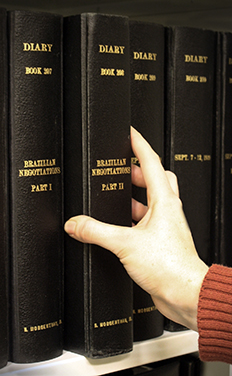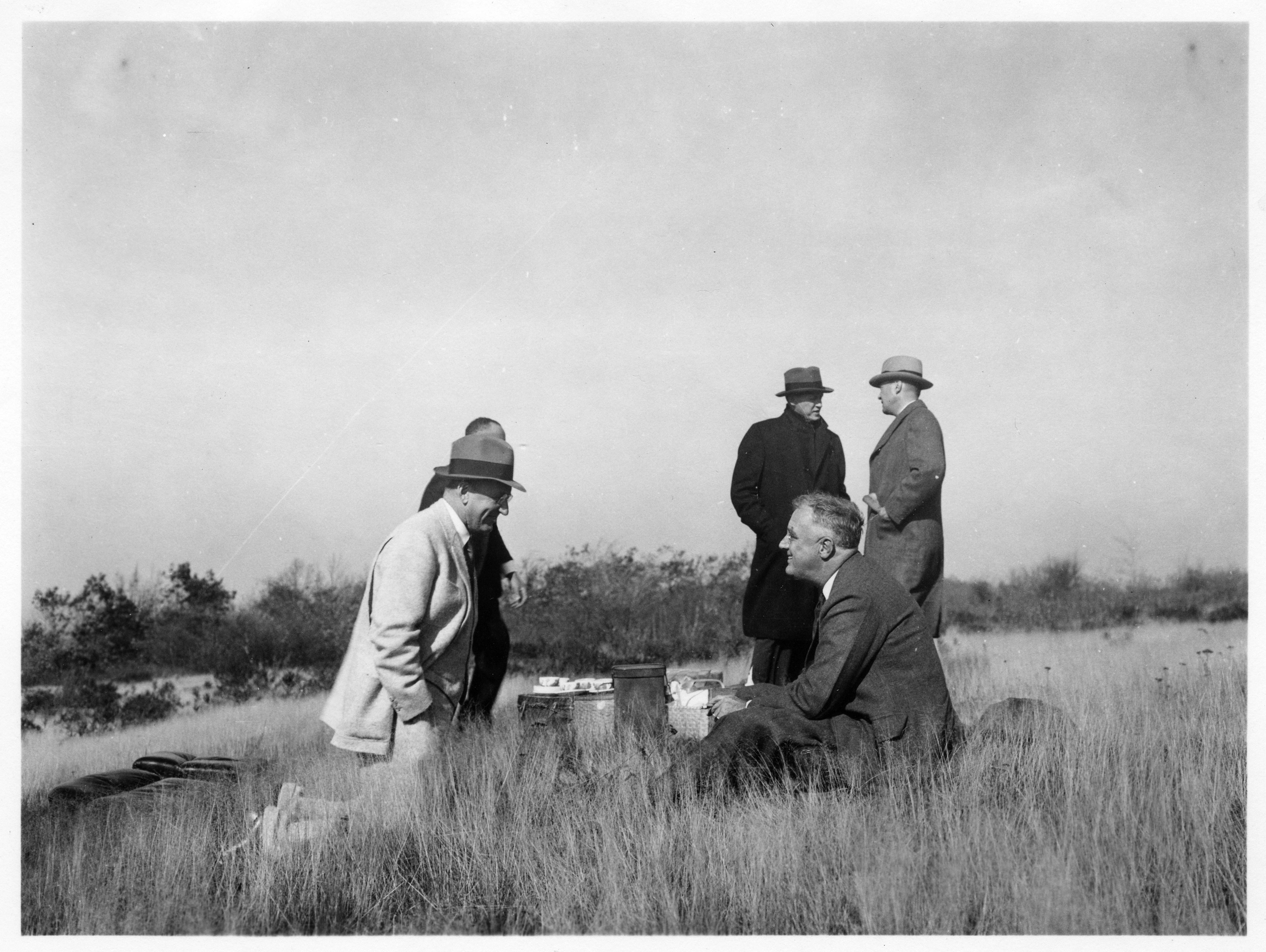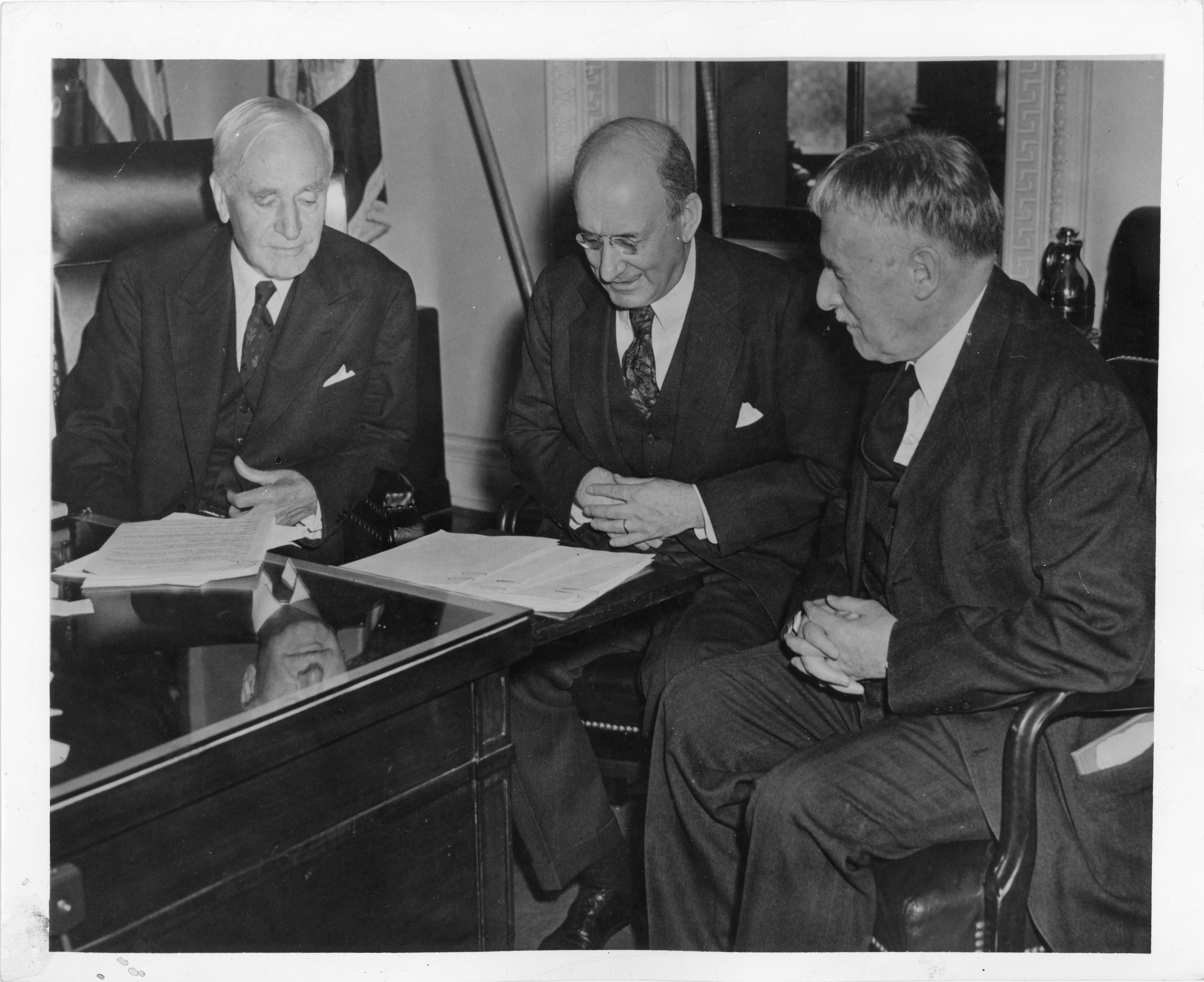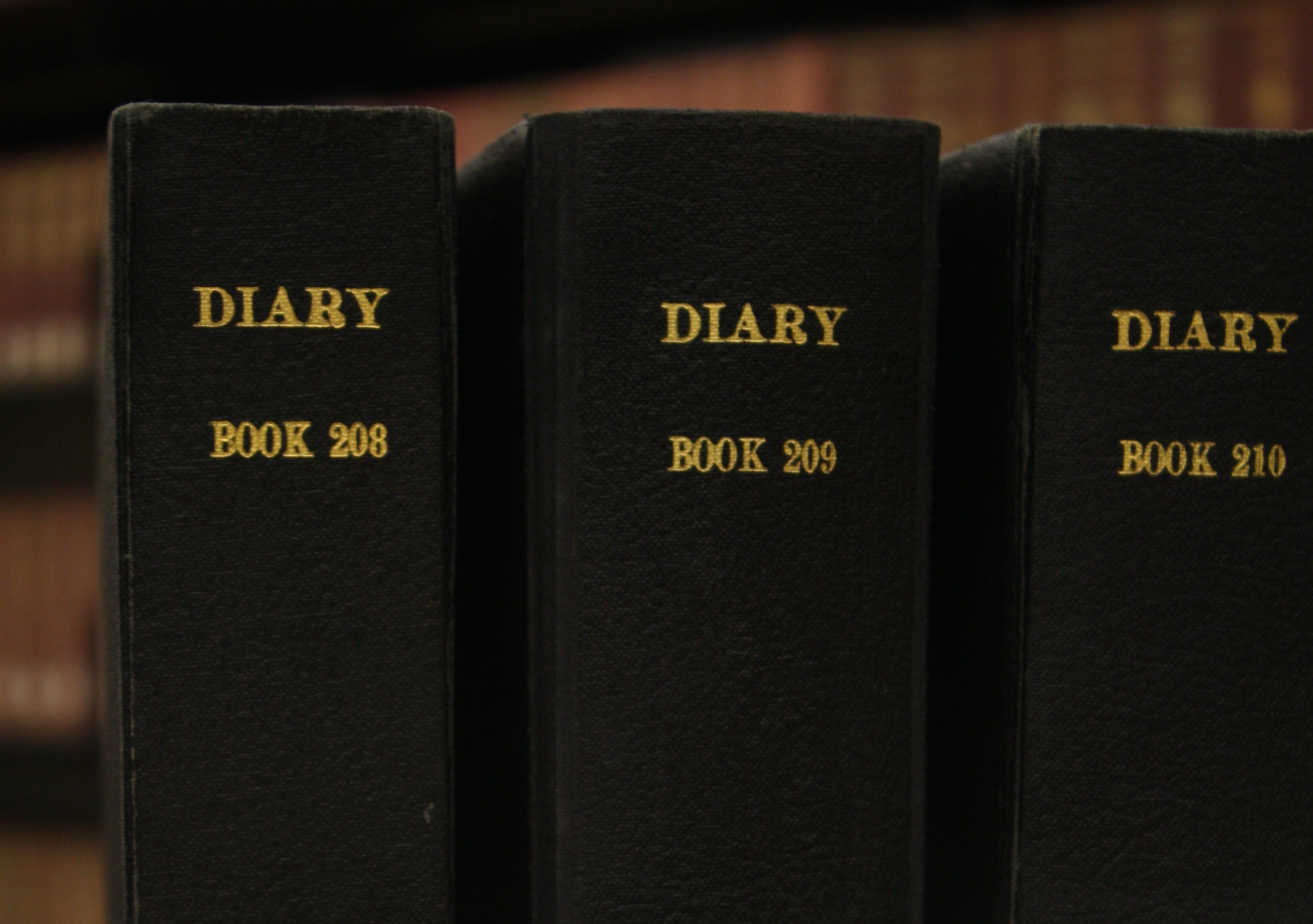
FRANKLIN, the Library's virtual research room and digital repository, now provides free online access to more than 400,000 pages documenting the life, career, and accomplishments of Henry Morgenthau, Jr., a personal friend of FDR and one of the most significant figures of the Roosevelt Administration.
Morgenthau Diaries and Press Conferences
Henry Morgenthau, Jr. was an influential Cabinet member whose work had direct and far-reaching effects on the New Deal and World War II. New digital collections in FRANKLIN shed light on his remarkable career and friendship with Franklin D. Roosevelt.
The original Morgenthau Diaries, bound into more than 860 volumes, are a truly unique resource. The contents of these diaries are now fully available online through FRANKLIN: Access to the FDR Library's Digital Collections
During Henry Morgenthau, Jr.’s nearly 12 years as FDR’s Secretary of the Treasury (1934 to 1945), he compiled more than 860 diary volumes. These are not your typical diaries. Rather, they are Morgenthau’s daily record of his official activities, including transcripts of his meetings and telephone conversations as well as copies and originals of the most important correspondence and memoranda that passed over his desk. These diaries were then expertly indexed by Morgenthau’s trusted secretary, Henrietta Klotz. Combined, these diaries and index cards total more than 285,000 pages.
The Morgenthau Diaries also include a much smaller “Presidential Diary” of about 2,000 pages. These diaries contain memoranda of his meetings with FDR, recollections of Cabinet meetings, and handwritten notes or chits passed between the two men. They provide a unique window into the personal and professional relationship of FDR and Morgenthau. During his Secretaryship, Morgenthau also delivered hundreds of press conferences which were transcribed and then microfilmed. These press conferences cover subjects ranging from New Deal monetary policy and war loan drives to refugee issues and post-war planning. They total approximately 15,000 pages.
Access the New Digital Collections in FRANKLIN:
Henry Morgenthau, Jr. Diaries
Henry Morgenthau, Jr. Press Conferences
Records of the War Refugee Board

The original Morgenthau Diaries, bound into more than 860 volumes, are a truly unique resource. The contents of these diaries are now fully available online through FRANKLIN: Access to the FDR Library's Digital Collections
The Morgenthau Diaries and Press Conferences are some of the most unique resources in the Roosevelt Library. No other Cabinet official kept as complete a record of his official activities and his relationship to the President than Henry Morgenthau, Jr.
Eleanor Roosevelt once wrote: “[F]or so many years, both as friends and as workers, my husband and I were closely associated with Mr. and Mrs. Henry Morgenthau, Jr… It is interesting to know that my husband never held a political office from the time of his governorship of New York State without having Henry Morgenthau, Jr., in some way in his official family... [T]here was an underlying deep devotion and trust which never really wavered.”
In digitizing the Diaries and Press Conferences of Henry Morgenthau, Jr., the Franklin D. Roosevelt Presidential Library and Museum seeks to enhance the understanding of Morgenthau’s contributions to the New Deal and war effort as FDR’s Secretary of the Treasury. Now, through the Library’s FRANKLIN virtual research room and digital repository, online users can access hundreds of thousands of pages documenting his life and work.

Henry Morgenthau, Jr. and FDR picnic at Sunset Hill in Pine Plains, NY. August, 1940. NPx 73-113:49
Records of the War Refugee Board
There was, perhaps, no greater contribution made by Henry Morgenthau, Jr., during his time as Secretary of the Treasury than his advocacy and commitment to the issue of rescuing Jewish refugees from Nazi-occupied Europe. Morgenthau’s investigations into the State Department’s obstruction of rescue efforts and his presentation of the evidence to the President resulted in FDR’s creation in January 1944 of the War Refugee Board. As Treasury Secretary, Morgenthau served on the WRB, and the Board is credited with saving the lives of up to 200,000 refugees. The story of Henry Morgenthau, Jr., cannot be told without also telling the story of the War Refugee Board.
The Records of the War Refugee Board, major sections of which are now available in FRANKLIN, are housed at the FDR Presidential Library & Museum. These records contain correspondence, telegrams, petitions, and press materials pertaining to policies, programs, and operations of the Board. This significant Holocaust-era collection includes insider’s descriptions of extermination camps like Auschwitz and Treblinka, documentation of rescue efforts made by citizens and government agents alike, and correspondence with several major figures in international Jewish history.

Secretary of State Cordell Hull, Secretary of Treasury Henry Morgenthau, Jr., and Secretary of War Henry Stimson confer during the third meeting of the War Refugee Board on March 21, 1944. NpX 88-1(68)
Special Thanks
The following individuals were instrumental in bringing the Morgenthau Diaries and Press Conferences to a universal audience through their support for FRANKLIN, and each has our tremendous gratitude:
Friends of Morgenthau (Robert M. Morgenthau)
The Melinda & William J. vanden Huevel Foundation
(William J. vanden Huevel)
Arthur M. Handler
James D. Zirin
Marina P. & Stephen E. Kaufman Foundation
(Stephen E. Kaufman)
The Bernard W. Nussbaum Family Foundation
(Bernard W. Nussbaum)
The Wedgeon Point Charitable Foundation
(John R. Robinson)
The Judy & Michael Steinhardt Foundation
(Thomas H. Baer)
Frank M. & Barbara W. Tuerkheimer
Otto G. Obermaier
Michael W. Mitchell
David R. Murdock
Cumming Foundation (Jesse Grant)
Thomas L. Pulling
Major sections of the War Refugee Papers are now available for online research thanks to the generous donation of digital images made by researcher Rebecca Erbelding from the Roosevelt Library's collections.
The Library would also like to thank The Crowley Company of Frederick, Maryland for its excellent work in digitizing the Morgenthau Diaries from microfilm, and Project Archivist Amy Berish for processing the digital collection.
As Eleanor Roosevelt once observed, the Library’s Henry Morgenthau collections “will provide material of an essential kind for future historians…. From [them] emerges the existence of basic trust and respect between two men who lived in strenuous and exciting times which required great qualities and, I think, fostered great friendships.”



